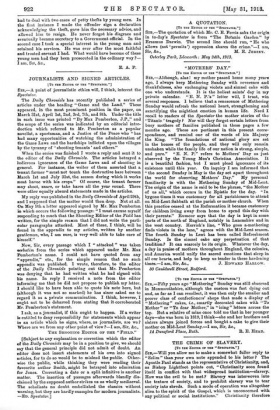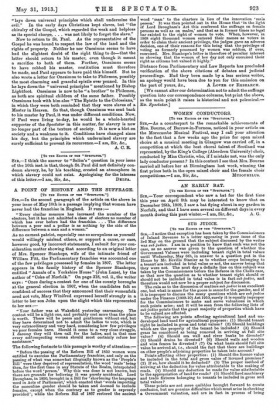THE CRIME OF SLAVERY.
[To THE EDITOR 01 THE " arscreroR...] you allow me to make a somewhat fuller reply to "Selina" than your own note appended to his letter ? The Apostle Paul stands as the representative of Christianity, and, as Bishop Lightfoot points out, " Christianity soon found itself in conflict with that widespread institution—slavery. How was the evil to be met? Slavery was interwoven into the texture of society, and to prohibit slavery was to tear society into shreds. Such a mode of operation was altogether alien to the spirit of the Gospel, which is unconcerned with
any political or social institutions." Christianity therefore "lays down universal principles which shall undermine the evil." In the early days Christians kept slaves, but "the chivalry of the Gospel, which regarded the weak and helpless as its special charge, . . . was not likely to forget the slave."
Now to return to St. Paul. As the representative of the Gospel he was bound to respect the law of the land and the rights of property. Neither he nor Onesimus seems to have had the slightest doubt of the right thing to do—that the latter should return to his master, even though it meant a sacrifice to both of them. Further, Onesimus seems to have robbed his master, restitution must therefore be made, and Paul appears to have paid this himself. But be also wrote a letter for Onesimus to take to Philemon, possibly the most charming and graceful epistle ever penned. In this he lays down the " universal principles " mentioned by Bishop Lightfoot. Onesimus is now to be " a brother" to Philemon, as both are spiritual children of the same father. Possibly Onesimus took with him also " The Epistle to the Colossians," in which they were both reminded that they were slaves of a Master in Heaven. So that, though Onesimus was sent back to his master by Paul, it was under different conditions. Now, if Paul were living to-day, he would be a whole-hearted supporter of the Spectator in this matter, for slavery is now no longer part of the texture of society. It is now a blot on society and a weakness to it. Conditions have changed since his day, but the principles which undermined slavery are surely sufficient to prevent its recurrence.—I am, Sir, &c.,
A. C. R.



















































 Previous page
Previous page